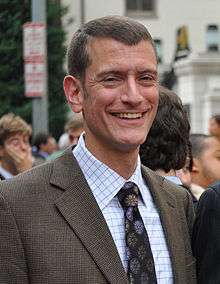Jonathan Rotenberg
| Jonathan Rotenberg | |
|---|---|
 | |
| Born |
29 April 1963 Boston, Massachusetts, USA |
| Nationality | USA |
| Alma mater | Brown University, Harvard Business School |
| Occupation | Executive coach, Management consultant |
| Known for | Co-founder of The Boston Computer Society |
Jonathan Rotenberg (born April 29, 1963) is an executive coach, management consultant, and author. In 1977, he cofounded The Boston Computer Society, which became the world's largest personal computer user organization. He is currently writing a book about what he learned from his early mentor, Apple founder Steve Jobs.[1]
Early life
Jonathan was born in Boston, MA. He is a graduate of Commonwealth School, an independent high school in Boston's Back Bay. As a 13-year-old freshman, he cofounded The Boston Computer Society in the school's library.
Education
Rotenberg has an A.B. in Economics from Brown University; an MBA from Harvard Business School; and a Graduate Certificate in Executive Coaching from the Massachusetts School of Professional Psychology.
Career
The Boston Computer Society
Rotenberg cofounded an organization to demystify personal computers called The Boston Computer Society, popularly known as the BCS. He was its president from 1977 to 1990. During that period, the Society became the leading international forum where personal computer companies unveiled groundbreaking new products and technologies to the public. For example, in 1979 Dan Bricklin and Bob Frankston introduced the first spreadsheet program, VisiCalc.
In 1984, Steve Jobs and Steve Wozniak made the first public presentation of the Macintosh at the BCS. Mitch Kapor introduced Lotus 1-2-3. Dozens of industry leaders — from Bill Gates to Michael Dell, Nolan Bushnell to Esther Dyson, Ray Kurzweil to Sherry Turkle, Seymour Papert to Dan Bricklin — came each month to connect with BCS members. The Society developed more than a hundred user and special-interest subgroups, many of which became the largest of their kind in the world. It published over 20 publications and sponsored nearly a hundred educational programs each month.
Before his twenty-first birthday, Rotenberg had been profiled in The Wall Street Journal[2] (front page), PEOPLE, InfoWorld,[3] The New York Times,[4] BusinessWeek,[5] The Boston Globe[1] and TIME magazine, and on CBS Evening News.[6] In 1990, Jonathan moved from president of the BCS to become its chairman.
Management Consulting
Jonathan began his career in management consulting at a Cambridge, Massachusetts consulting firm, Monitor Group, which was founded in 1983 by six entrepreneurs with Harvard Business School ties.[3] He was with Monitor from 1991 to 1999. Jonathan became a strategy consultant with internet consulting firm Viant Inc. in 1999. He later joined Fair Isaac Corp. and was co-leader of its management consulting organization.
Jonathan's work as a management consultant focuses on customer-centric enterprise transformation: Helping large companies redesign sales, marketing, e-channels, customer care, and operations around the needs and desires of target customers.[7] He has advised and guided senior leadership teams of several Fortune 500 companies on multi-year, enterprise-wide transformation initiatives.
Executive Coaching
Since 2012, Jonathan has been an executive coach. He works with senior executives on leadership development and developing high-performance organizations.
Writing
Jonathan is writing a book called My Teacher Steve Jobs. The book is about his friendship from 1981 – 2011 with Apple founder Steve Jobs, and what Jobs taught him about idealism, spirituality and leadership. A first chapter of the book was published by High Tech History.[8]
Awards
Rotenberg was named one of the “Top 100 Young Entrepreneurs in America” by the Association of Collegiate Entrepreneurs. Computer Reseller News named him “One of the 25 Most Influential Executives in the Personal Computer Industry.” And Slashdot named him one of the “Top 150 i-Technology Heroes of All Time.”[9]
His brother Marc Rotenberg is President and Executive Director of the Electronic Privacy Information Center (EPIC) in Washington, DC.
References
- 1 2 The Double Life of Jonathan Rotenberg Boston Globe, March 29, 1995. p.63
- ↑ The Latest Whiz Kid of Computers Runs on a Novel Program Wall Street Journal, October 19, 1982, p.1
- ↑ Growing Pains in Boston InfoWorld, November 26, 1984, p.29
- ↑ Boston Computers: A User's Decade New York Times, January 11, 1987
- ↑ A Different Kind of Computer Whiz Kid Business Week, March 9, 1987, p.97
- ↑ Interview, by Charles Osgood CBS Evening News, October 29, 1982
- ↑ Becoming a Customer-Centric Enterprise
- ↑ June 6, 1981: The Day I Met Steve Jobs
- ↑ Jonathan's About page